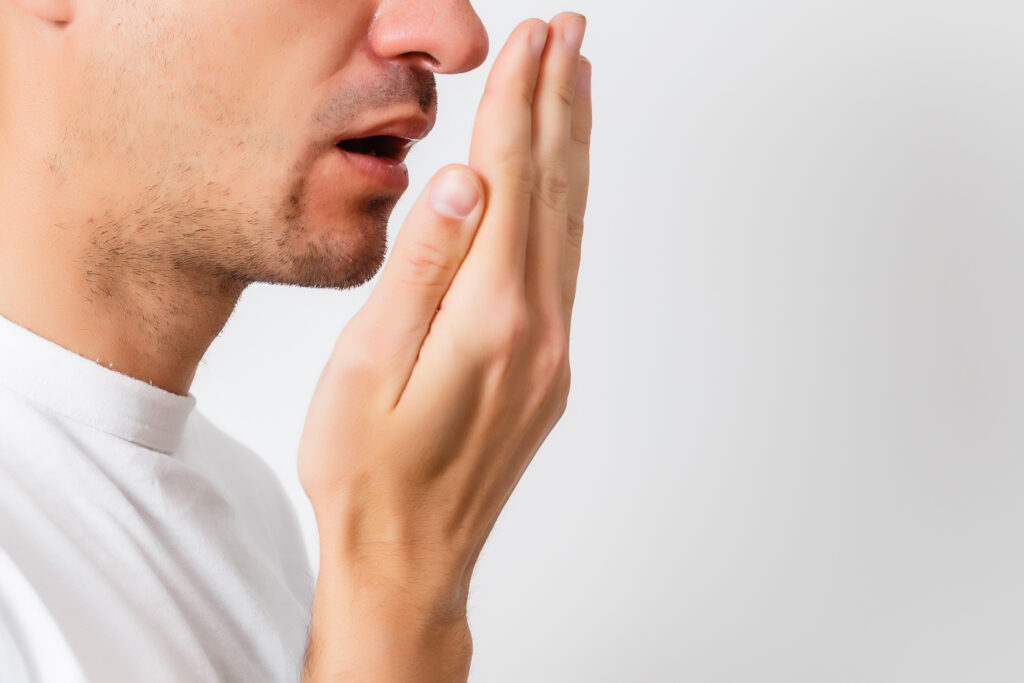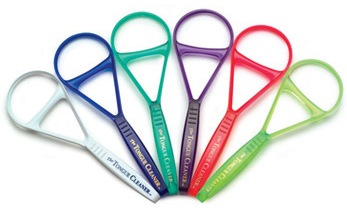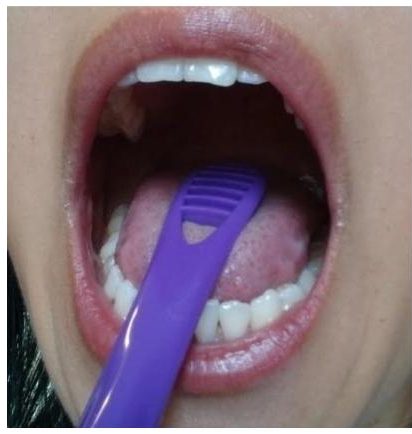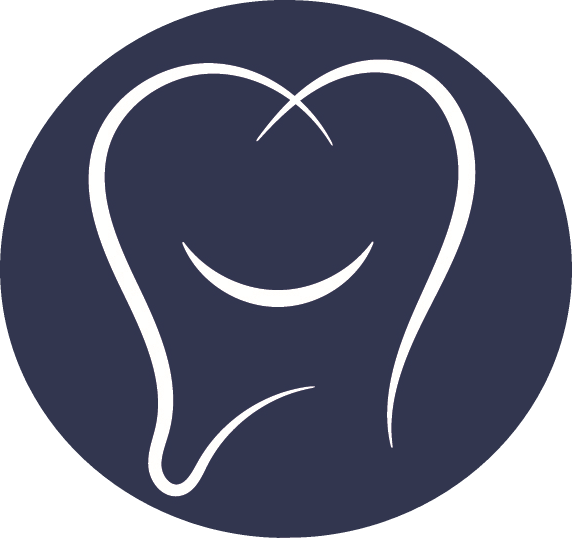
07 Mar Saving Your Breath
There are fewer things more socially awkward than having bad breath. No one can even concentrate on what you’re saying, no matter how charming and interesting you sound. And it’s worse when you do not even realize you have it and no one has the heart to tell you.
Some quick ways to tell if you have bad breath: use a spoon and scrape your tongue (as far back as you can manage) and smell the stuff you’ve scraped off. Or lick the back of your hand and wait for it to dry. The smell on the spoon and the back of your hand is what people smell when you are talking to them. You can also smell your floss after you have used it.

If you do not smell anything noxious, then you probably do not need to read on. Your breath already smells great.
For the majority of us, there are many reasons bad breath can develop. The cause of that rotten egg smell in our breaths is caused by anaerobic sulfur-producing bacteria. These bacteria normally live within the surface of the tongue and in the throat; mainly toward the back of the mouth.
These bacteria are supposed to be there because they assist us in digesting proteins in our food, as well as break down proteins in mucous, in blood, and in dead oral tissue. Once the bacteria breaks down proteins, it releases methyl mercaptan which smells awful.
The best way to prevent bad breath is to remove these bits of protein before the bacteria can act on them and to remove the byproducts of the bacterial activity. There are medications that can reduce the bacterial activity but it is usually healthier to not interfere with our natural body systems.
“But doc, I already brush and floss everyday” Well, that is certainly a good first step in battling bad breath.
The next step in your regimen should involve scraping your tongue clean everyday. You may have even seen tongue cleaners like these:


The proper way to use tongue cleaners is to start at the back of the tongue (as far back as you can tolerate) and pull forward with enough pressure to scrape off that white/yellow/brown film you see. Repeat as needed. I find about 5-8 passes is needed to really clean the tongue. Avoid excessive pressure where your tongue is left raw and bleeding.
You might experience a gag reflex. No way to sugarcoat that or get around it.
Some people use a toothbrush to clean their tongue and that is fine. Just know that a tongue cleaner is more effective and easier to clean. Remember our goal is to remove this junk from our mouths, not leave it on our toothbrush so we can put it back in our mouths the next time we brush.
Some other causes of bad breath include certain foods we eat, dry mouth, gum disease, tonsil stones, and certain medical problems.
Many patients suffer from dry mouth (low or no saliva flow) because it is a side effect of some medications. Good saliva flow helps us clear out food and debris from our mouths so when you have reduced flow, the bacteria in our mouths will have more chances to act on those proteins we mentioned.
If you are not sure if your medication causes dry mouth, check the label for a side effect called “xerostomia”. There are over the counter saliva analogs you can get to augment the saliva you produce. Ex. Biotene. You can also increase your water intake, especially after meals to help swallow all of the food.
Morning breath is commonly caused by reduced saliva flow when we are asleep. It is very difficult for our bodies to produce much saliva during this time and it is the main reason why most people have morning breath to some degree. If you happen to be a mouth-breather when you sleep, then the problem of dry mouth is further exacerbated. Unfortunately, there are not a lot of remedies for this other than making sure your oral hygiene is impeccable before you go to bed.
Gum disease, aka periodontal disease, produces a very distinct odor that differs from the sulfur smell. The odor indicates an active process that is destroying your oral soft tissue as well as the bone in your jaws. This is a chronic, genetic condition and you will need to see your dentist to get this under control.
Tonsil stones also cause a very distinct odor. It has been likened to rotting garbage or rotting anything because the stones are bits of food you swallowed that get caught in your tonsils. You can try to remove these tonsil stones with a cotton tip applicator. A better long term solution is to have your tonsils removed if tonsil stones are a recurrent problem for you.
Several internal medical conditions also can cause bad breath. They include diabetes, liver disease, respiratory tract infections, and chronic bronchitis. You will also want to see your physician to rule out things like acid reflux, post nasal drip, etc.
This is certainly not an exhaustive list of causes but a general guideline to chronic bad breath. Some people may experience short periods of bad breath due to dental infections, the types of food eaten, and eating disorders but in these cases, most people can figure out the cause and take steps to resolve that.
Some Home Remedies – Good or Bad?
- avoid alcohol-based mouth rinses (they will dry out your mouth)
- do not use any concentration of water:bleach mixture rinses (can be toxic)
- avoid mint gum or drops (they will dry out your mouth)
- baking soda rinses (no known dangers unless you swallow it)
- oil pulling (no known dangers unless you swallow a lot of it)
I understand that if you are in a bind, you will need a breath mint or a Listerine rinse but for the long term, it is best to practice thorough and effective oral hygiene methods to combat bad breath.
For those of us who feel this is a constant uphill battle – it is. Some people have to apply deodorant more than once a day and some people have to shave their beards or legs everyday. You would likely not let your body odor or hair growth run rampant, why should your bad breath be any different?
Phuong Luu, DDS
The tongue scraper showed a 75% reduction in volatile sulfur compounds (VSC’s), while the toothbrush only achieved a 45% reduction in VSCs. Although the tongue coating was removed by both methods, the tongue scraper performed better in reducing the production of volatile sulfur compounds.
J Periodontol. 2004 Jul;75(7):1009-12. Tongue-cleaning methods: a comparative clinical trial employing a toothbrush and a tongue scraper. Pedrazzi V1, Sato S, de Mattos Mda G, Lara EH, Panzeri H.


